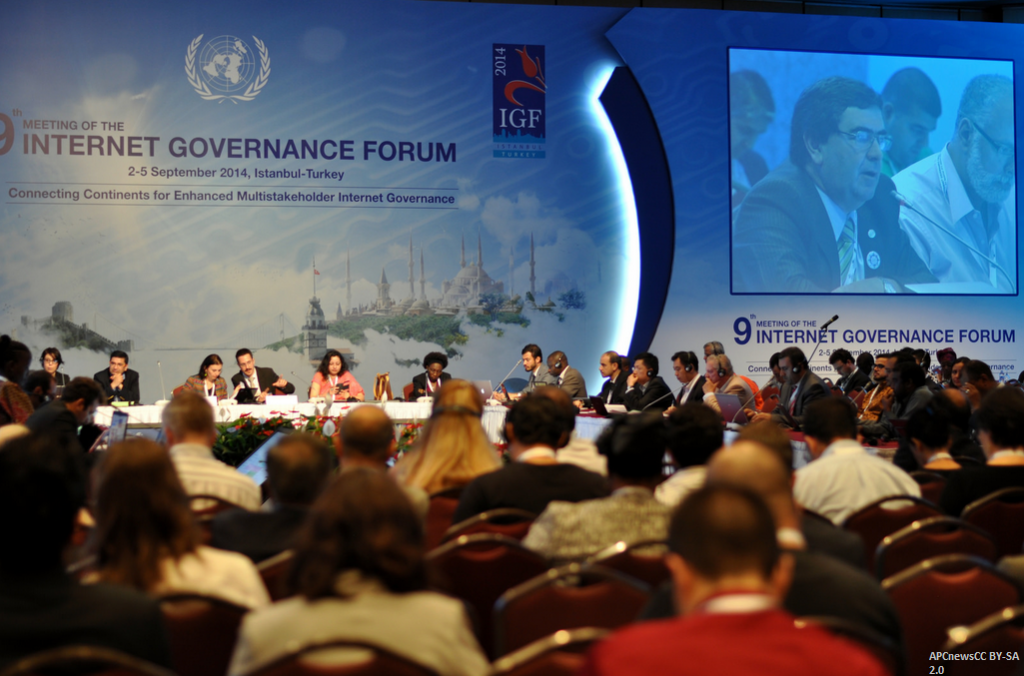Internet Governance Forum 2014: A simplified balance
by Digital Rights LAC on October 29, 2014
Valeria Betancourt
APC
The meeting held in Turkey on 2-5 September 2014 showed that the Internet Governance Forum (IGF) process is not, as many people think and argue, a fait accompli without the chance of evolving and improving.
The fact that the organisers of the different workshops related to the issues of the Internet and human rights agreed on a common message to be brought to the United Nations Human Rights Council panel on Privacy in the Digital Age (held on September 12, 2012) and that such situation has raised no controversy or averse effect is, at least, remarkable*. Is this one of the effects of the NETmundial? One can speculate that the NETmundial, as a multisectoral process, had an influence once it meant a substantial progress towards the consensus that Internet governance must be based on public interest and human rights oriented . The development of inter-agency dialogue regarding Internet governance shows a significant breaking point towards placing the IGF in a more relevant position within the global Internet governance ecosystem and sets an important precedent for the IGF 2015 to be held in Brazil**.
Expectations for the holding of a net neutrality main session for the first time in IGF’s history, upon NETmundial’s request, were high. Discussion, in my opinion, led to the conclusion that instead of trying to achieve common understanding of the concept and scope of net neutrality, it might be convenient to focus future deliberations within specific contexts, especially developing countries, in order to identify the economic implications of the problem and those which have an impact in the exercise of human rights, to envision effective solutions at the market level and to agree on cooperation approaches among governments within the same region.
We cannot help mentioning the Internet Ungovernance Forum. It was created in a parallel space which rendered visible local issues regarding Internet fundamental freedoms and human rights in Turkey (such as censorship, surveillance of communications, Internet market structure based in monopolies, and control systems over infrastructure and online content, among others***) which gave rise to discussions concerning the civil society global and collective action. The existence of alternative platforms to generate discussion and debate is key to democracy, especially when official spaces limit the possibility to address critical issues which have an impact on civil society. The IGF should not evade raising a significant criticism about the situation of the countries where annual meetings are held. Regarding Turkey, the government was not affected and increased the application of restrictions almost immediately after the IGF .
Regarding the presence of the region, even though the level of participation of Latin American actors has increased, such level is still low****. The only exception concerning a sustained and prominent participation is Brazil. From my standpoint, this is because when a country has an ongoing multisectoral national process, Internet-related public policies, as well as internal and external strategies on Internet governance, such country can make use of regional and global spaces and relate to them effectively and be involved in decision making or influence in the configuration of decisions. The role of regional governments in order to implement multisectoral processes and move towards defining their Internet governance agendas becomes even more urgent and necessary in order to seize the performance of the IGF 2015 in Brazil, on the one hand, and the strengthening of the regional process which on July 2014 identified priorities and development challenges regarding the framework of principles and a roadmap for Internet governance in Latin America, on the other.
One of the persisting challenges of the IGF is the involvement and effective integration with regional IGFs. How to solve this? The answer is not quite simple since the way the IGF process works does not make global and regional connection easy. However, it might be conceived that if general thematic areas are set out from the beginning of the IGF annual cycle, regional forums and meetings can include such areas on their discussions and contribute in a procedure to prepare the global event.
The ball will be for the second time in the Latin American field in 2015. It has come a long way since Brazil hosted the IGF in 2007. How is the region taking this opportunity to make progress in the establishment of plural, democratic, participatory and transparent mechanisms to ensure Internet governance multisectoral participation nationally? Which specific answers will be given to face the region’s challenges in terms of cybersecurity, net neutrality, privacy, and freedom of expression, among others?
*See the IGF 2014 Chair’s Summary
**Especially, since recommendation that a new best practice forum on the protection of privacy in the digital age which works on the preparatory process for the IGF 2015 is created, using regional and national IGFs to ensure inclusion of participants from developing countries.
***See a special report by the Global Information Society Watch for the IGF 2014 which analyzes the situation related to human rights on the Internet
****The IGF 2015 gathered more than 2000 participants present in person.






